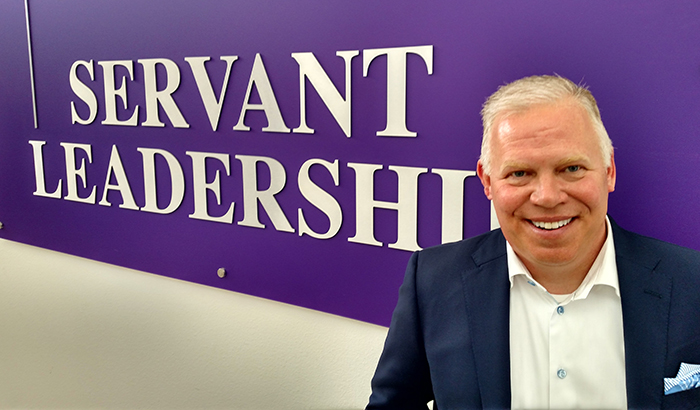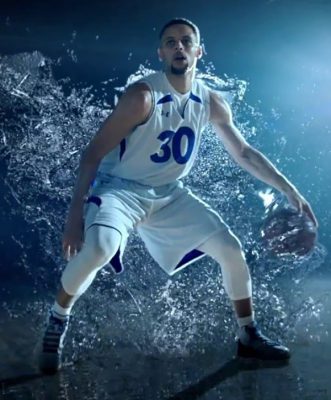
By Rick Vacek
GCU News Bureau
A guy from Clorox? What does that have to do with sports? What’s he going to teach us – how to properly bleach uniforms?
The questions no doubt crossed the minds of more than a few Colangelo School of Sports Business students who were invited to a talk Wednesday morning by Ed Huber, Vice President/General Manager of The Clorox Company.
But Huber quickly showed the attendees in the Colangelo College of Business building that he has knowledge far more important to them than how to get their whites whiter. He brought with him to the Grand Canyon University campus insights into a highly successful sports marketing campaign that is a first for his company.

Clorox, like most major corporations, has diversified in a number of areas, and one of those is its line of Brita water-filtering pitchers. When it was looking for a spokesman, it just so happened that the Golden State Warriors practice facility is right across the street from the Clorox offices in Oakland, Calif.
It also was a nice coincidence that Huber calls himself “a sports junkie,” and when he reached out to the agency that represents Warriors star Stephen Curry, he learned that Curry – unlike many other athletes – wasn’t interested in doing advertisements for a soda. But water, that was another matter.
One other tidy little coincidence: Huber’s marketing director went to Davidson (N.C.) College, which just happens to be Curry’s alma mater. The deal was done.
Maybe you’ve seen one of the series of Brita ads. They are not just about selling water pitchers. They are about an environmental and health-related cause, as you can see here. The company introduced Curry as its spokesman in this press release.
“You think, you get Steph Curry and you’re going to make killer commercials,” Huber said. “But that’s only part of the story.”
The ads have gotten a lot of social media attention. But the main thing, Huber emphasized, is that they’ve gotten noticed.
“I don’t need something to be beautiful. I need it to be beautiful and impactful,” he said.
Later in his presentation, he displayed a slide that read, “When you do it right, everyone wins – Brita, Steph, consumer, planet.”
Besides giving students insights into the thinking and analytics that go into a campaign of this nature, Huber also shared pointers about what they can do with the knowledge they have once they get out in the working world.
He expanded on that afterward. When asked the No. 1 thing he wanted them to hear, he had a lot to say:
“Don’t lose the gift of being inquisitive because that’s what you’re going to bring to an employer – you have this fresh perspective, that of a different generation than the people that you’re working for. Ask questions. Try to understand. And what you’ll do through a lot of that is that you’ll find that there are solutions to problems that no one else had thought of. Clorox is a really, really great company, but sometimes what prevents breakthrough is the fact that you’re a really, really good company.
“Don’t think everyone around has got it all figured out. Disruptive is not a negative term – it’s reality. We’re going to need to help these young kids be adaptive to help manage through change, and once you figure it out it’s going to change again. We find that, even when we have interns at Clorox, you’ll put them on a project and you’ll sit there and go, ‘I’ve been doing this 30 years and I never would have thought of that.’ The world is changing quickly, and your perspective is going to matter.”
Huber listed a number of companies that have changed the world, such as Airbnb, Uber, Lyft and Dollar Shave Club. Established companies such as Clorox (founded in 1913) have the know-how and the technology but have to hustle to keep up.
“How do you keep your brand relevant in a world where technology, like Amazon, is commoditizing things?” he asked. “What brands do is we invest in technology. We use analytics to gauge impact. For every dollar you spend, you should get at least a dollar back.”
Brita is fighting the fact that bottled water is so convenient – Huber said that 60 percent of bottled water usage is in the home. He also cited a study that showed that, by 2050, there will be more plastic in the oceans than fish.
Scary stuff – worth a change in habits and an impactful advertising campaign. But he also warned about the importance of picking the right spokesman, and as he put it, “There aren’t a lot of Steph Currys out there.”
So what is the two-time National Basketball Association Most Valuable Player like when he’s filming an ad? Is he as nice as he seems?
“Nicer,” Huber replied. “He’s always prepared. He’s a really intelligent guy, so he needs very little prep. He nails his lines the first time.
“I think the thing that has impressed me the most is that he is very authentic. We didn’t go out and solicit him as much as he was saying, ‘Hey, I’m not open to other beverages but I would be open to water.’ Even after these big, long production days, even though you know he wants to get home with his family, he stops and talks to the entire crew, takes pictures with them.”
Huber’s talk was yet another example of how students can learn from a variety of sources on all sides of the sports business spectrum – and those sources are still learning, too.
“Everything we’re doing in marketing is changing overnight,” he said.
It’s all coming out in the wash, and it has everything to do with the business of sports – even when you least expect it.
Contact Rick Vacek at (602) 639-8203 or [email protected].









































































